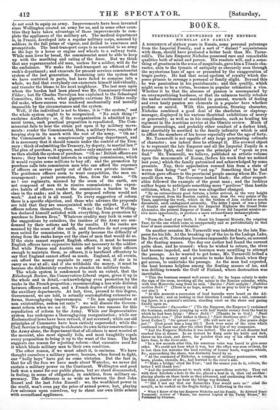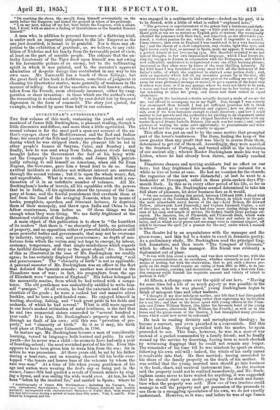BOOKS.
TIIIINERELLI'S KNOWLEDGE OF THE EMPEROR NICHOLAS AND FAMILY"
A nEsmExcE of sixteen years in Russia, some personal patronage from the Imperial Family, and a sort of " distant " acquaintance with them, should have produced a better book than Mr. Turne- relli's. The late Emperor Nicholas possessed rare and remarkable qualities both of mind and person. His resolute will, and a some- thing of greatness in the sense of magnitude, gave him a Titanic cha- racter, akin to the tyrants of antiquity as obscurely seen through the mysterious haze of ages or presented by the exaggeration of tragic poetry. He had that usual egotism of royalty which dis- poses princes to revenge a personal or family slight. Beyond this he was passionless in his punishments ; and this quality, which might seem to be a virtue, becomes in popular estimation a vice. Whether it be that the absence of passion is accompanied by an unsympathizing hardness, or that its calmness tacitly rebukes the undue excitement of mankind in general, warmth of feeling and even hasty passion are elements in a popular hero whether profane or sacred. With this passionless, freezing character, Nicholas combined a good deal of the charlatan or claptrap- manager, displayed in his various theatrical exhibitions of mercy or generosity, as well as in his compliments, such as heading his regiment in the Austrian service at the Olmiitz review. Much of these proceedings, and probably other conduct of a darker kind, may charitably be ascribed to the family infirmity which is said to afflict the members of his house especially after the age of forty. Mr. Turnerelli is not capable of any large penetrating estimate of character ; nor indeed does he attempt it. His avowed object is to represent the late Emperor and all the Imperial Family in a favourable light, and this upon the principle of "speak as you find." Mr. Turnerelli, we believe, published an artistic volume upon the monuments of Kazan, (before his work that we noticed last year,) which the family patronized and acknowledged by some presents. Nay, their approbation rescued him from a state of worse than being "cut " or "cut up." Something that he had written gave offence to the provincial people among whom Mr. Tur- nerelli then was. The Governor looked black ; the other respect- ables followed the example of the great man ; and the luckless author began to anticipate something more "perilous" than hostile criticism, when, lo ! the scene was altogether changed.
" By an extraordinary good fortune, a letter arrived, in the very height of the tempest, from the Russian capital, nay, from the very palace of the Tzars, approving the work, which on the borders of Asia excited so much discontent, such undisguised animosity. The letter I speak of was a letter of thanks and approbation from his Imperial Highness the Grand Duke Alexander, the present Emperor of Russia. Never did Imperial missive ar- rive more opportunely, or produce a more extraordinary metamorphosis.
"From the land of my birth, I thank his Imperial Majesty, the reigning Tzar, for the one which came so unexpectedly and so providentially in that hour of most unmerited tribulation."
On another occasion Mr. Turnerelli was indebted to the late Em- peror for his life. At the breaking up of the ice in the Ladoga Lake, the Neva at St. Petersburg becomes impassable for boats, on account of the floating masses. One day our author had found the current quite clear, and he crossed : when he wished to return, the river had become impeded, and the boatmen were unwilling to attempt the passage. As he wanted to get home, Mr. Turnerelli bribed a boatman, by money and a promise to make him drunk when they got across, to undertake the passage. As the man had expected, the boat became helpless among the floating masses of ice, and was drifting towards the Gulf of Finland, where destruction was inevitable.
" This the boatman seemed well aware of ; for he began calmly to make the sign of the cross, invoking all the saints in the Russian calendar, while, with true Muscovite sang froid he said, Barinn ! Niett nadejda ! Sradobno molitsa Bokh ! ' (There is no hope, master : let us gray to God to forgive US
our sins !) * • • "At this moment a succession of loud hurrahs were heard on the Ad- miralty bank ; and on looking in that direction I could see a tall, command- ing figure, in a general's uniform, standing erect on the shore and gazing fixedly upon us.
" Gossoudar ! Gossoudar ! ' ('Tis the Emperor, the Emperor !) exclaimed the boatman, suddenly jumping up with half frantic ecstacy from the boat in which he had been lying : 'Slave Bokh ! ' (Thanks be to God.) 'Nash Batouschka tam ! ' (Our father is there) 'Nash lioubimoe otetz !' (Our be- loved Father !) On spasset +lass I ' (He will save us!) 'Dee yensou dolgo feet ! (God grant him a long life I) Such were some of the cries which continued to burst one after the other from the lips of my companion. "And the Emperor Nicholas it was indeed. The news of our disaster had reached him at dinner. In an instant he flung aside his knife and fork, threw on his cloak, and drove, far quicker than any of his officers would
have done, to the river-side. * •
"In a few seconds after this, his sonorous voice was heard to give some order. We could not hear what it was, but the effect was soon evident, for in less than ten minutes the loud rattling of horses' hoofs, waggon-wheels, &e., approaching the shore, was distinctly heard by us. " At the command of Nicholas, a company of military pontonniers, with boats, planks, utensils, &c., had hurried to the river's side. " 'Make a bridge, cried the Tzar ; and the sooner you do it, rebiata, the better I will thank you.' "And the pontonniers set to work with a marvellous activity. They cut with their hatchets a hole in the ice, placed a boat in it, then cut another : placing planks on these boats as they advanced, and continuing this work, in less than a quarter of an hour the bridge was finished. "'Did I not say that our Batouchka Tzar would save us !' cried the moujik, as he rushed on the fragile bridge ; I following in the rear.
• What I Know of the late Emperor Nicholas and his Family. By Edward Tracy Turneralli. Author of "Kazan, the Ancient Capital of the Tartar Khans," Re. Published by Churton.
"On reaching the shore, the moujik flung himself reverentially on the earth before the Emperor, and kissed the ground in token of his gratitude. "I on my part, taking off my bat, bent before the Emperor, with a silent, but, I trust, with as sincere a feeling of thankfulness as the bearded Russian
himself."
A man who, in addition to personal favours of a flattering kind, is under such an important obligation to the late Emperor as the one just described, is bound to be grateful. Nor is there any ob- jection to the exhibition of gratitude, or, we believe, to any exhi- bition of Nicholas and his family from the favourable point of view, at least on the part of sensible people. The ridicule that the un- lucky Lieutenant of the Tiger drew upon himself was not owing to his favourable picture of an enemy, but to the tufthunting spirit in which it was painted, and to the narrator's apparent admiration of despotic doings that contributed in any way to his own ease. Mr. Turnerelli has a touch of these failings ; but the great fault of his book is feebleness, sometimes of judgment in choosing his illustrative stories, more generally of weakness in the manner of telling. Some of the anecdotes are well known ; others, taken from the French, seem obviously incorrect, either by exag- geration or sheer invention : in those which are the author's own, the recounting is weakened not only by over-detail but by frequent digression in the form of comment. The story just quoted, for example, is reduced by more than half in our columns.



























 Previous page
Previous page